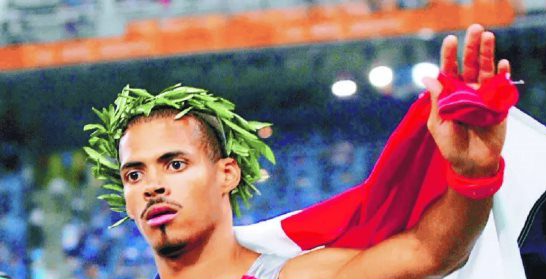BTN News: On August 26, 2004, the Dominican Republic experienced a moment that would forever be etched in its history: Félix Sánchez secured the nation’s first Olympic gold medal in the 400 meters hurdles at the Athens Games. This victory wasn’t just about winning a race; it was a triumph over a two-decade drought on the Olympic podium, a moment that elevated the Dominican Republic’s status in the world of sports. Before Sánchez’s golden achievement, the only other Olympic medal for the country had been the celebrated bronze won by Pedro Julio Nolasco in boxing at the 1984 Los Angeles Olympics. Sánchez’s victory in Athens wasn’t merely a personal triumph—it was a beacon of hope and pride for an entire nation.
In Athens, Félix Sánchez ran the race of his life, crossing the finish line with a time of 47.63 seconds, his best performance of the season. He outpaced his closest competitors, Jamaica’s Danny McFarlane, who took silver with a time of 48.11, and France’s Naman Keïta, who claimed the bronze with 48.26. The significance of this win was not lost on Sánchez, who had been preparing for this moment since his heartbreak at the Sydney 2000 Olympics, where he missed out on the final despite a valiant effort in the semifinals. It was after that defeat in Sydney that Sánchez donned a wristband, a silent vow to himself that he would wear it until he stood on the Olympic podium. And on that unforgettable day in Athens, Sánchez triumphantly removed the wristband, having fulfilled his promise to himself and his nation.
This victory was not only a personal achievement for Sánchez but also a symbol of perseverance and determination for the Dominican Republic. The wristband, which had become a part of Sánchez’s identity, was later acquired by the Dominican entrepreneur and sportsman Ramón Hipólito Mejía, further cementing its place in the country’s sports history.
Sánchez’s historic gold medal was celebrated in a packed Athens Olympic Stadium, where he received not only his medal but also the traditional olive crown, a symbol of honor and victory dating back to the ancient Olympic Games. The image of Sánchez standing on the podium, draped in his country’s flag, remains one of the most iconic moments in Dominican sports history.
Fast forward two decades, and on August 9, 2024, the Dominican Republic celebrated another historic moment in the world of athletics. Marileidy Paulino, a rising star in track and field, brought home the country’s third Olympic gold medal and the first ever by a Dominican woman. Competing in the Paris 2024 Olympics, Paulino delivered a stunning performance that echoed Sánchez’s victory two decades earlier. Her triumph was met with overwhelming joy and pride, not just because of her individual achievement, but because it represented a new chapter in the Dominican Republic’s Olympic journey.
In recognition of her outstanding achievement, the Dominican government awarded Paulino a luxurious “yipeta” (SUV) and a financial package of 4 million pesos, which she used towards purchasing an apartment in the prestigious Malecon Center. This reward was a testament to the significance of her accomplishment and the pride she brought to her nation.
Marileidy Paulino’s gold in Paris is not just a personal victory, but a milestone that continues the legacy of Félix Sánchez, whose second Olympic gold came in London 2012, further solidifying his place as one of the greatest athletes in the history of the Dominican Republic. The achievements of both Sánchez and Paulino serve as powerful reminders of what can be achieved through dedication, hard work, and an unyielding belief in oneself.
However, despite these monumental achievements, there is a lingering concern that such significant dates may not be celebrated with the reverence they deserve in the future. The victories of Félix Sánchez and Marileidy Paulino are more than just sports achievements; they are milestones in the Dominican Republic’s history, moments that have brought immense pride to the nation and should be commemorated accordingly.
As the years go by, it is crucial to remember and honor the legacies of these athletes who have brought glory to the Dominican Republic. Their victories should serve as an inspiration to future generations, reminding them that with perseverance and determination, they too can achieve greatness on the world stage.


